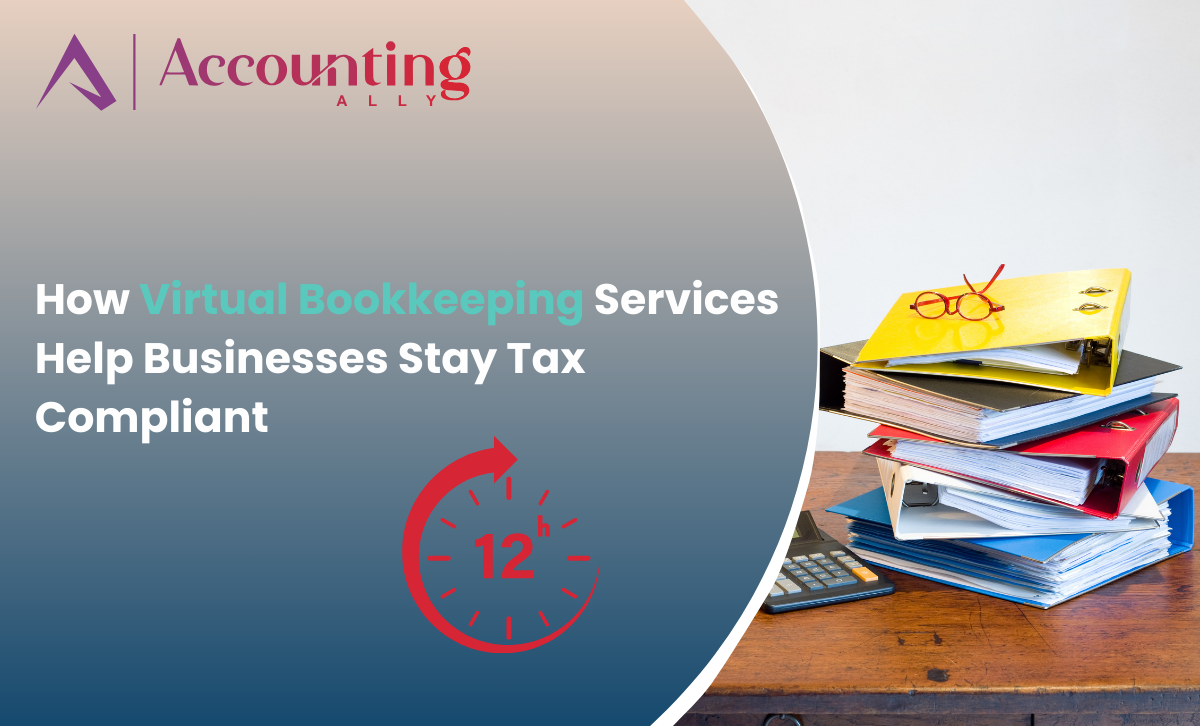How Virtual Bookkeeping Services Help Businesses Stay Tax Compliant

For startups and small businesses, tax compliance is often one of the most challenging aspects of financial management. With changing tax laws, reporting deadlines, and numerous forms to file, it’s easy to fall behind. One late submission or incorrect filing can lead to penalties, interest charges, and even audits.
That’s where virtual bookkeeping services step in as a powerful ally. Beyond organizing your books, virtual bookkeepers provide critical support to ensure your business remains fully tax-compliant, giving you peace of mind and the freedom to focus on growth.
In this blog, we’ll explore how virtual bookkeeping helps businesses stay compliant with tax regulations, avoid costly mistakes, and optimize their tax strategy.
What Are Virtual Bookkeeping Services?
Virtual bookkeeping refers to the process of managing your company’s books remotely through cloud-based accounting software. Unlike traditional bookkeepers who work on-site, virtual bookkeepers work off-site and offer services such as:
- Transaction recording
- Bank reconciliations
- Payroll processing
- Expense categorization
- Financial reporting
- Tax-ready financial documentation
Many startups and SMBs prefer virtual bookkeeping because it is cost-effective, scalable, and accessible from anywhere.
Popular Software Used by Virtual Bookkeepers
One of the biggest advantages of virtual bookkeeping is the use of modern, cloud-based accounting tools. These platforms offer real-time financial insights, seamless integrations, and tax-compliant reporting. Some of the most commonly used software include:
- QuickBooks Online: One of the most popular platforms for small businesses, known for its user-friendly interface and strong tax features.
- Xero: A powerful and scalable solution with multi-currency support, automation, and tax calculation capabilities.
- Sage Business Cloud: Ideal for growing businesses that require more robust reporting and compliance tools.
- Zoho Books: An affordable option for startups, offering strong invoicing, GST compliance (especially in India), and automation.
- SAP: Best suited for larger enterprises with complex financial needs and strict regulatory requirements.
- Oracle NetSuite: A comprehensive cloud ERP solution that integrates accounting, CRM, inventory, and compliance under one platform.
Virtual bookkeepers are trained to work across these platforms and can help businesses choose, implement, and optimize the right software for their needs, ensuring seamless tax compliance.
How Virtual Bookkeeping Ensures Tax Compliance?
- Accurate Record Keeping Maintaining accurate and up-to-date records is the foundation of tax compliance. Virtual bookkeepers ensure every transaction is categorized correctly, receipts are stored, and ledgers are balanced. This accuracy reduces the risk of errors when filing taxes.
- Real-Time Financial Reporting Virtual bookkeeping platforms offer real-time dashboards and financial reports. These reports provide visibility into your income, expenses, and profits—all critical for making tax-related decisions and preparing quarterly estimates.
- Deadline Management Tax compliance is all about timing. Missing a deadline can result in penalties. Virtual bookkeepers use automated systems to track and remind you of:
- Quarterly estimated tax payments
- Sales tax filings
- Annual returns
- Payroll tax submissions
- Compliance with Regulatory Changes Tax laws are constantly evolving. Virtual bookkeeping providers stay current with IRS regulations and local tax codes to ensure your business stays compliant, even as laws change.
- Preparation for Tax Filing Your CPA or tax preparer will need clean, organized, and accurate books to file your taxes. Virtual bookkeepers ensure that all your financials are tax-ready, reducing the back-and-forth and last-minute rush during tax season.
- Audit Support In the unfortunate event of an audit, having organized and easily accessible records can make all the difference. Virtual bookkeepers can quickly retrieve and present the necessary documents to support your filings.
- Integrated Payroll & Sales Tax Services Virtual bookkeeping often includes add-on services like payroll and sales tax tracking. These integrations ensure accurate withholdings, filings, and payments, which are crucial for tax compliance.
- Data Security & Backup Secure, cloud-based bookkeeping platforms protect your data with encryption, automatic backups, and secure access protocols. This ensures that critical financial documents are never lost and always accessible when needed for tax purposes.
Benefits of Staying Tax Compliant with Virtual Bookkeeping
- Avoid Penalties: No missed deadlines or incorrect filings.
- Better Cash Flow Management: Plan for tax liabilities in advance.
- Stress-Free Tax Season: Everything is organized and ready for your accountant.
- Enhanced Credibility: Tax compliance builds trust with investors, lenders, and government authorities.
- Focus on Growth: Let the experts handle compliance while you grow your business.
Why Startups and SMBs Choose Virtual Bookkeeping for Compliance?
Startups and growing businesses often operate with limited resources. Hiring an in-house team for bookkeeping and tax compliance can be expensive and time-consuming.
Virtual bookkeeping offers:
- Affordability: Lower overhead costs with pay-as-you-go pricing.
- Scalability: Easily adjust services as your business evolves.
- Expertise on Demand: Access to experienced professionals familiar with small business taxes.
- Anytime Access: View your books, reports, and documents from any device, anywhere.
How Accounting Ally Helps You Stay Tax Compliant
At Accounting Ally, we specialize in helping startups and small businesses manage their books and stay tax compliant. Our virtual bookkeeping services are designed to ensure:
- Accurate and timely transaction recording
- Tax-ready financial reporting
- Payroll and sales tax integration
- Deadline tracking and filing support
- Real-time dashboards for financial visibility
We bring extensive hands-on expertise across a wide range of leading accounting platforms including QuickBooks Online, Xero, Zoho Books, Sage, SAP, and Oracle NetSuite. Whether your business runs on a lightweight solution or a full-scale ERP, our team is well-versed in setting up, optimizing, and managing financial systems that meet both operational and compliance needs.
With our support, you can reduce your risk, avoid costly penalties, and always be prepared for tax season.
Conclusion
Staying tax compliant doesn’t have to be stressful or time-consuming. With virtual bookkeeping services, startups and small businesses can ensure accuracy, timeliness, and peace of mind. By partnering with a reliable provider like Accounting Ally, you not only streamline your bookkeeping but also strengthen your business’s financial foundation.
Let us help you take the guesswork out of taxes and stay one step ahead.
Frequently Asked Questions (FAQs)
- Are virtual bookkeepers qualified to help with taxes? Yes, many virtual bookkeeping providers employ certified bookkeepers and accountants who are experienced in tax preparation and compliance.
- How do virtual bookkeepers help avoid tax penalties? They track deadlines, ensure accurate recordkeeping, and prepare tax-ready reports, which minimizes the chance of errors or late filings.
- Can I access my financials anytime with virtual bookkeeping? Yes, virtual bookkeeping platforms are cloud-based, giving you 24/7 access to your financial data.
- Do virtual bookkeepers file my taxes? While they don’t typically file taxes directly, they prepare your books and reports for your CPA or tax preparer to file with ease.
- Is virtual bookkeeping secure? Absolutely. Reputable providers use bank-level encryption, secure login protocols, and regular backups to keep your data safe.
- Can virtual bookkeeping integrate with my payroll system? Yes. Most virtual bookkeepers use tools that integrate seamlessly with payroll and sales tax software.
- How often should I update my books for tax compliance? Ideally, your books should be updated weekly or monthly to stay on top of tax obligations and avoid surprises.

